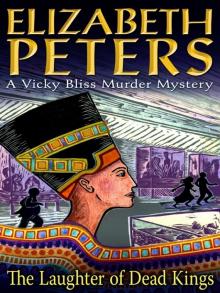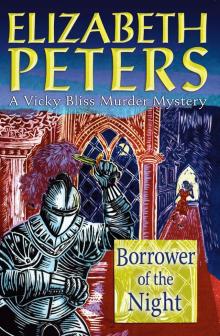- Home
- Elizabeth Peters
Borrower of the Night vbm-1 Page 5
Borrower of the Night vbm-1 Read online
Page 5
We both burst out laughing. Tony glowered. Blankenhagen lowered his newspaper, gave us a contemptuous stare in common, and hid behind it again.
The waitress, a stolid blond damsel, came with our soup, and the meal proceeded. Tony sulked in silence, Blankenhagen read his newspaper, and George and I kept up the social amenities. He was a master of the double entendre, and I don’t mean just the sexual entendre. He kept dropping hints about sculpture and secret passages in ancient castles. Tony writhed, but I was pleased to see he was learning to control his tongue. Part of George’s technique was to probe until he got an angry, unthinking response.
With the dessert came Irma, hot and harassed, but still disgustingly beautiful, to inquire how we had liked the meal. She didn’t give a damn, really. It was just part of the job. Tony bounded to his feet the moment she appeared, and even Blankenhagen registered a touch of emotion. I began to wonder about Tony’s joie de vivre. Maybe it had another cause than the one I had suspected.
When the meal was over, Tony got to his feet and reached for my hand.
‘Excuse us,’ he said firmly. ‘I want to talk to Vicky alone.’
George was amused.
‘Help yourself,’ he said.
We proceeded, in pregnant silence, to the courtyard. Behind the sheltering hedge lay a diminutive garden, its flowers pale pastel in the twilight. Tony sat me down on a bench and stood over me.
‘Well?’
‘Well what?’
Tony sat down beside me and reached out.
‘Oh, come off it,’ he mumbled. ‘Don’t be that way. No reason why we can’t be civil, is there?’
‘Civil, is it?’ I said, into the hollow between his neck and his right shoulder. ‘Hmmm . . . I wasn’t the one who started this stand-off business, you know.’
The succeeding interval lasted a shorter time than one might have expected. All at once Tony took me by the shoulders and pushed me away.
‘I can’t concentrate,’ he said in an aggrieved tone. ‘Why did we start this silly fight in the first place? I haven’t been able to think of anything else for months. It’s interfering with my social life and my normal emotional development.’
‘You challenged me,’ I reminded him. ‘Want to take back what you said?’
‘No!’
‘Then we’d better kiss and part. I can’t concentrate on any other subject either; and we aren’t collaborating, are we?’
‘No . . .’
‘Only?’
‘Only – well, we could compare background notes, couldn’t we? Nothing significant, just research. So we can start out even.’
‘Hmmm,’ I said. ‘Why the change of heart?’
‘It isn’t a change of heart. I’m not asking you to give anything away, and I’m not going to tell you anything important. Only – well, Nolan bugs me. I didn’t realize he was so hot on the trail. And if I can’t find the thing myself, I’d rather have you get it than Nolan.’
I didn’t return the compliment. If I couldn’t find the shrine, I hoped nobody would. But his suggestion made sense. I didn’t have anything that could be called a clue; maybe he did. I had nothing to lose by collaborating.
As it turned out, I didn’t gain much. For the most part, Tony’s research duplicated mine.
We had both gone back to the old chronicle, which contributed very little except a description of the shrine. If my appetite had needed whetting, that description would have done the trick.
According to the chronicler, the reliquary depicted the Three Kings kneeling before the Child – the ‘Anbetung der Könige,’ as the Germans put it. The subject was popular with European artists in earlier, more devout, eras, so it is not surprising that another version of the Anbetung, by Riemenschneider, should exist. This one is a bas-relief, on the side panel of the Altar of the Virgin, which he did for the church at Creglingen, not far from Rothenburg. So when I pictured our shrine I pictured it as he had done it at Creglingen, only in the round instead of in relief. The design was simple and forceful – the Virgin, seated, with two of the kings kneeling before her and the third standing at her right. Of course I knew the Drachenstein shrine wouldn’t be quite the same, but the subject was only open to a few variations. Since the old chronicle mentioned angels, I gave my visionary shrine a few of Riemenschneider’s typical winged beauties – not chubby dimpled babies, but grave ageless creatures with flowing hair and robes fluttering in the splendour of flight.
The three jewels were a ruby, an emerald, and an enormous baroque pearl.
Tony had looked this up too, but he professed to be more intrigued by the people who had been involved with the shrine back in 1525. (Women are always moved by crass materialistic things such as jewels; men concern themselves with the higher things of life.)
‘You had better get the characters straight in your mind,’ Tony said smugly. ‘There were three of them. The count, Burckhardt, was a typical knight – and I’m not thinking, like, Sir Galahad. I assume you had the simple wit to write the author of The Peasants’ Revolt, and ask if there were any other letters from Burckhardt? Oh. You did.
‘Burckhardt was a rat. A bloodthirsty, illiterate lout. His repulsive personality is even more apparent in the unpublished letters. I guess that’s why they weren’t published; they tell more about Burckhardt than about the war. He was obstinate, unimaginative, arrogant – ’
‘My goodness,’ I said mildly. ‘You really are down on the lad.’
‘Lad, my eye.’
‘He couldn’t have been very old. What was the average life span – about forty? As you say, he was fairly typical. Why the prejudice?’
‘Not all of them were hairy Neanderthals. Take Götz von Berlichingen; he supported the peasants.’
‘Under protest, according to Götz. I don’t think he’s a good example of a parfit gentle knight. He was a menace on the highways, a robber, looter – ’
‘At least he had courage. After his hand was shot off, he acquired an iron prosthesis and went on robbing.’
‘I stayed at his place once.’
‘Whose place?’
‘Götz’s,’ I said, spitting a little on the sibilants. ‘Schloss Hornburg, on the Neckar. It’s a hotel now. They have his iron hand.’
‘I wish you would stop changing the subject,’ Tony said unfairly.
‘You were the one who brought up Götz.’
‘And stop calling him Götz, as if he were the boy next door . . . To return to Burckhardt – he was only heroic when he was up against a bunch of serfs armed with sticks. And did you notice the hypochondria? All those complaints about his bowels!’
‘Maybe he had a nervous stomach.’
I could have said something really cutting. Tony’s prejudice against the valiant knight suggested a transferral of resentment against men of action in general – not mentioning any names. But I didn’t even hint at such a possibility. I didn’t like Burckhardt either.
‘He had one good point,’ Tony said grudgingly. ‘He loved his wife. That comes out, even through the stiff formal phrasing. I couldn’t find much information on her. All I know is that her name was Konstanze and she was beautiful.’
I started. I shouldn’t have been surprised. The dates on the portrait in my room would have told me that the woman portrayed had been the lady of our count. But it was – uncomfortable, somehow.
Tony gave me a curious look, but asked no questions. He went on, ‘The third character was named Nicolas Duvenvoorde. He was the count’s steward, majordomo, or whatever you want to call it. He was Flemish, by his name, and a trusted, efficient servant, to judge by the references to him. Now one of the unpublished letters, if you remember, says the count has sent ‘it’ to Rothenburg in the care of this steward and an armed escort of five men. The countryside was in disorder; bands of marauding peasants and men at arms marauding after the marauding peasants – ’
‘Don’t be cute,’ I said. ‘I’m not one of your giggly girl students.’
‘Then yo
u tell me what happened next.’
‘I take it you found no further references to the shrine? Neither did I. But, assuming the caravan started on schedule, there are only two possibilities.’
Tony nodded. ‘Either the shrine arrived in Rothenburg as planned – no reason why not; a group of armed men, on their guard, with their precious burden a secret, had a good chance of getting through – or else they were attacked along the way and the shrine was stolen.’
‘No reason why not?’ I echoed. ‘But is there any reason to suppose the reverse? If the shrine was stolen, that would explain why it hasn’t been heard of since.’
‘Obviously. But if thieves seized and burned the shrine, what happened to the jewels? Such stones are virtually indestructible, and they have a habit of reappearing. Look at the great historic gems; you can trace them through the centuries, usually by the trail of blood they leave behind them. The fact that the jewels, as well as the shrine, have not been heard of since fifteen twenty-five is suggestive. They must have been hidden – hidden so well that all memory of the hiding place was lost.’
‘Suppose your hypothetical peasants did the hiding, after they robbed the caravan. The cache could be anywhere in West Germany.’
‘Or farther. But that isn’t likely. A single thief couldn’t overpower six armed men. And if there were several thieves, the chance of all of them being killed before they could pass on the secret of the hiding place is remote. Besides, where could they hide it, a group of homeless peasants, so that the hiding place remained undisturbed for four hundred and fifty years? Now this castle . . .’
The massive walls seemed to close in around us. Tony’s reasoning wasn’t new to me; I had reached the same conclusions, not because we were en rapport, but because they were logical conclusions. There were plenty of holes, and weak links, in the chain of reasoning, but at the end of it lay a solid fact: even on the evidence we had, Schloss Drachenstein was worth searching.
I said as much. Tony snorted vulgarly. Like all men, he likes to have his lectures received with little feminine squeals of admiration. So I added tactfully, ‘But that’s as far as logic took me, Tony. Suppose the shrine is here. Where do we look? The castle is enormous. You’re so clever at this sort of thing; can’t you narrow it down?’
Tony is very susceptible to the grosser forms of flattery. He beamed.
‘Obviously the shrine wasn’t left out on a shelf, in plain sight. Rothenburg was a real hotbed of radicalism, and although the revolt was officially suppressed before Burckhardt got home, I would think he’d prefer to tuck his valuables away till things were back to normal. Now here’s an interesting point that maybe you didn’t know. The count and his wife both died that same year, leaving an infant daughter. I don’t know how Burckhardt and Konstanze died, but it must have been suddenly. They had no opportunity to pass on the secret. The child was too young to know anything.’
‘It’s plausible. If the shrine exists, it is hidden somewhere in the older section of the Schloss.’
‘I wish I knew the layout of the place a little better. Where do Irma and the old Gräfin live? It would be mildly embarrassing to meet one of them while we were ripping up the floor.’
‘The dowager’s rooms are in the tower at the end of our wing.’ Tony gestured. ‘I think Irma’s room is under the old lady’s.’
‘Nuts. I hoped I was alone in the old wing.’
‘You’re surrounded,’ Tony said, with mean satisfaction. ‘Nolan’s room is down the hall. I’m next to you, and on your other side is Dr Blankenhagen, our conversational tablemate. The little fat guy is next to me. That’s about all . . . Oh, yeah, the English female is in the tower too. I told you she was a crony of the Gräfin.’
‘Good God. How can we do any searching? It’s like Main Street on Saturday night.’
‘If you’re planning to start ripping up floor boards in the guest rooms, you aren’t as logical as you think you are.’
I sighed ostentatiously.
‘Must I explain my reasoning? I thought it was obvious.’
‘I’ve been sharing my humble thinking with you. Go ahead, be obvious.’
‘Well, isn’t the master bedchamber – Burckhardt’s own room – the logical place in which to start searching?’
‘It might be, if we knew which room was Burckhardt’s.’
At that moment the moon rose above the wall and turned the little garden into something out of Rostand. I glanced at Tony. He put his arm around me and I leaned back against it.
‘I can’t fight with you,’ Tony said.
‘You can’t fight with anybody. You’re too nice a guy. No, none of that. We were reasoning, remember. What we need is a plan of the Schloss as it was in the good old days. Or we could ask the Gräfin which room was the master bedchamber.’
‘I’m against that.’
‘So am I,’ I agreed amiably. ‘We don’t want to rouse any suspicions. Anyhow, she may not know.’
‘And until we know, I don’t see any point in searching the bedrooms. The hiding place won’t be obvious; you really would have to rip up floors and tear down the walls.’
‘Anyhow,’ I said thoughtfully, ‘the count’s room might not have been the best place to hide something. Didn’t they have servants and attendants hanging around all the time?’
‘I wouldn’t say that. But there are any number of equally likely places: Such as – ’
‘Don’t,’ I said suddenly. The garden was a magical place, but it was a little uncanny, with the rustling shrubbery and a breeze moving the branches of the trees. ‘Let’s go in. I’ve had enough atmosphere for tonight. I could stand a glass of plain prosaic beer.’
We had our beer, served by Irma, in the room of the château that served as a lounge. The family from Hamburg were playing Skat and the honeymoon couple, in a shadowy corner, were fully occupied with each other. The only person in the room who wasn’t distracted by the squeaks and giggles coming from that corner was the English lady, who sat knitting like a robot, without removing her eyes from her needles. George was nowhere to be seen, and I wondered uneasily about the rustling I had heard in the garden.
When the clock struck ten, there was a general exodus. Apparently Rothenburg, like my home town, rolled up the streets at an early hour. That was fine with me. I had other plans for the middle hours of the night.
At the door I was intercepted by the little man whom Tony had identified, somewhat vaguely, as a professor. He introduced himself with a big broad smile.
‘Ich heisse Schmidt. And you are the American Professorin, nicht? What is it that you teach?’
I admitted to being a historian. I was caught off guard by his blunt approach but it was impossible to resent the little guy. He did look like Santa Claus. Besides, he only came up to my chin. As I have said, I can’t be cruel to little people.
‘And you, Herr Schmidt?’ I asked. ‘Are you perhaps also a historian?’
Herr Schmidt’s eyes shifted. All at once he looked like a very sneaky Santa Claus.
‘Alas, I am no longer anything. I am, as you say, retired. I enjoy a long vacation. And you, I hope you find Rothenburg pleasant? You are, like me, in the older wing of the Schloss? It is charming! Full with atmosphere of the past, very appealing to Americans. But inconvenient, this charm. For example, we must light ourselves to bed. There is no electricity in the old wing.’
He picked up a candle, one of a row which stood atop a chest.
‘So I noticed,’ I said drily.
In a mellow moment Tony lit a candle for me and we found ourselves part of a small procession which wound its medieval way across the court. The candle flame flickered in the wind; I had to shield it with my hand. When we entered the Great Hall, the illusion of antiquity was complete. The feeble flames were overpowered by the vast darkness of the room. They woke a dim reflection in the polished surfaces of helmet and breastplate, giving the armoured shapes an illusion of life and surreptitious movement.
‘I am glad to ha
ve company when I cross this room,’ said Schmidt, scampering for the stairs. ‘Brrrr! In candlelight it is too full with atmosphere. I expect to see the countess herself.’
‘The countess?’
‘But yes, have you not heard the legend? The countess walks here, on moonlit nights. Which countess I know not, but she is one of those who has no right to be walking.’
He chuckled. I wasn’t amused. I had a feeling I knew which countess he meant. Nor was I precisely easy in my mind about Herr Schmidt. If ever a name sounded like an alias . . . And he had been decidedly elusive about his occupation.
In the dim light of the candle, my room looked like an apartment in Castle Dracula. I lit the oil lamp beside the bed, lay down, and tried to read. The smoky light made my eyes ache.
It was a warm night, but the room had a clammy chill which the air from the open window didn’t alleviate. I went to the window and looked down into the tangled underbrush beneath. There were no screens in the window; the drop was sheer. To the left was another window – that of Tony’s room, I assumed. It was dark, as were all the other windows I could see.
I looked across the grounds at the bulk of the old keep. The jagged walls made a picturesque outline against the moonlit sky. As I stared, something peculiar happened. For a moment a square of wavering yellow light interrupted the blackness of the tower’s silhouette. Just for a moment; then it was gone.
I gulped, and told myself to be rational. What I had seen was not a ghost light, but a candle, behind one of the windows of the keep. But why would anyone be in the crumbling ruin at this time of night?
A possible answer wasn’t hard to find.
Frowning, I turned from the window and met the enigmatic eyes of the Countess Konstanze.
I lifted the lamp from the table and held it up so that its light fell full on the painted face. It was not one of the world’s great portraits. Though the physical features seemed to be accurately represented, the painter had failed to capture a personality. He had been more successful with the pose – the shape of the head and shoulders, the arrogant tilt of the chin suggested a strength of character not implicit in the expressionless face. The resemblance of the sixteenth-century countess to her downtrodden descendant was probably not one of character; but feature by feature the resemblance was uncannily exact.

 Mystery Stories
Mystery Stories A River in the Sky
A River in the Sky He Shall Thunder in the Sky taps-12
He Shall Thunder in the Sky taps-12 Laughter of Dead Kings vbm-6
Laughter of Dead Kings vbm-6 Silhouette in Scarlet vbm-3
Silhouette in Scarlet vbm-3 Night Train to Memphis vbm-5
Night Train to Memphis vbm-5 Borrower of the Night vbm-1
Borrower of the Night vbm-1 The Golden One
The Golden One Trojan Gold vbm-4
Trojan Gold vbm-4 Crocodile On The Sandbank
Crocodile On The Sandbank